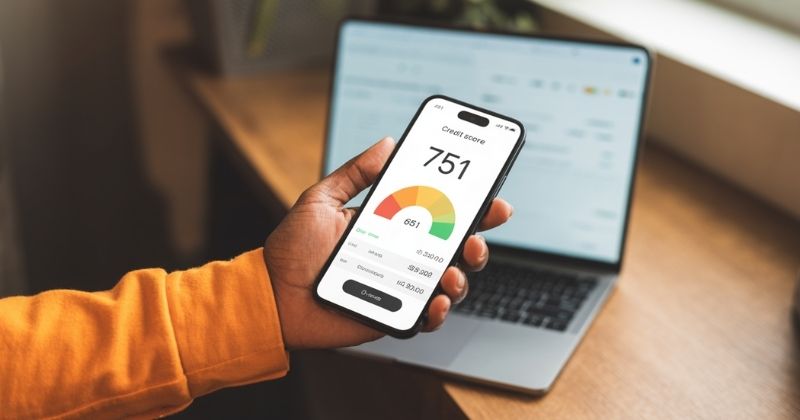
A credit score plays a major role when applying for loans, store accounts, or even mobile phone contracts in South Africa. Many people want to understand their credit standing, and a credit score calculator is a useful tool for this. It gives you an estimated score based on details like income, spending, debt, and payment history. While it doesn’t provide your exact bureau score, it offers a close estimate to help you manage your credit better. These tools are especially useful when planning to apply for credit or tracking how your financial actions might affect your score.
Key Takeaways
- Estimate Credit Health: Credit score calculators give South Africans an estimated score based on financial habits like repayments, credit use, and debt levels. These tools help users understand how their behaviour may affect future credit applications.
- Access via Trusted Platforms: South African credit bureaus such as TransUnion, Experian, Compuscan, and XDS offer calculators and credit reports. These services support users in tracking their credit profile and identifying ways to improve it.
- Impact on Credit Applications: A credit score influences approval decisions, interest rates, and loan terms. Keeping a good score involves paying on time, limiting credit usage, and avoiding too many applications.
About Arcadia Finance
Need a loan? Arcadia Finance makes it simple. No application fees, and access to 19 reliable, NCR-compliant lenders. It’s a safe, quick way to find the right financial fit for you.
What Is a Credit Score and Why Does It Matter?
A credit score is a three-digit figure that reflects your creditworthiness based on your financial history. It is calculated using a standard formula that looks at several factors, including how consistently you have made repayments, how long your credit history is, how much debt you currently owe, and the number of credit accounts in your name. This data is gathered from your credit report, which is compiled by credit bureaus and used by lenders to assess applications.
Credit scores typically fall into categories ranging from poor to excellent, and they play a role in determining the type of credit you may qualify for. They also affect the interest rate you may be charged, with lower scores often leading to higher costs. In some cases, your credit score can decide whether a credit provider approves or rejects your loan or account application. Lenders use this number to judge the level of risk involved when offering you credit.

What Is a Credit Score Calculator?
A credit score calculator is a tool that provides an estimate of your credit score based on the information you input. While it doesn’t access your actual credit report, it uses your responses to simulate how credit scoring models might assess your creditworthiness. This can help you understand where you stand financially and what factors might be influencing your score.
How Do Credit Score Calculators Estimate Your Score?
Credit score calculators work by asking questions about your financial habits and background. They usually request details such as whether you pay your bills on time, how much of your available credit you use, how long you’ve had credit accounts, the different types of credit you manage such as credit cards, personal loans, or home loans and whether you’ve recently applied for new credit.
Once you provide this information, the calculator uses common credit scoring principles to estimate your score. These tools are based on general scoring guidelines and are designed to give you a rough idea of where you might stand. However, the results may not be completely accurate, as actual credit scores are calculated using detailed credit reports and vary slightly between credit bureaus and lenders.
Why wait for a lender’s decision when you can Check Your Credit Score for Free today? This tool shows you the real figures used by banks: no surprises, no hidden fees, so you can plan your next move with confidence.
Where to Find Credit Score Calculators in South Africa
In South Africa, several credit bureaus and financial institutions offer tools to help you estimate your credit score. These tools are valuable for understanding your financial standing and planning for future credit applications.

TransUnion
TransUnion provides a free credit score service through their online platform. By registering, you can access your credit score and report, which are updated regularly. This service helps you monitor your credit status and identify areas for improvement.

Experian
Experian offers South African consumers access to their credit reports and scores via the My Credit Check portal. This platform allows you to view your credit information and understand the factors affecting your score.

Compuscan
Compuscan provides a user-friendly online portal called My Credit Check, where South African consumers can monitor their credit history and borrowing habits. The platform presents information clearly, helping you deduce what data has the most significant impact on your credit score.

XDS
XDS, a South African credit bureau, offers free access to your credit report and score through the Splendi platform. This service enables you to monitor your credit status and make informed financial decisions.

Other Platforms
In addition to the major credit bureaus, other financial institutions in South Africa provide credit score tools. For instance, Old Mutual offers a free credit score check through their CreditView platform, allowing you to access your credit information conveniently.
If you’ve worked or studied abroad, you might wonder how your overseas record stacks up. Our comparison of American Credit Score vs South Africa Credit Scores explains the key differences and what it means for your local borrowing power.

How Credit Bureaus Calculate Credit Scores
Credit bureaus in South Africa assess your credit score by reviewing different parts of your financial profile. Each area makes up a percentage of your overall score. While every bureau uses its own formula, the general weightings shared here are based on widely observed patterns and can help you understand what to focus on.
These percentages are estimates, as credit bureaus each follow their own scoring methods.
Payment History, 35%
Your payment record carries the most weight in your score, making up roughly 35%. This section looks at whether you pay your bills on time. Regular late payments lower your score, while paying on or before the due date improves it. Lenders prefer borrowers who have a consistent history of paying their accounts when expected.
Debt Utilisation, 30%
This section contributes around 30% of your score and refers to how much of your available credit you are using. It compares the credit limit you have to the amount of credit you’ve used. If you consistently use less than 30% of your credit limit, this will reflect positively.
For example, if your credit card has a R10 000 limit and you only use R2 500, your usage is 25%, which is considered responsible. This same rule applies across all credit accounts, aim to stay below the 30% threshold to maintain a better score.
Length of Credit History, 15%
The age of your credit accounts affects around 15% of your score. Older accounts tend to contribute positively. Lenders look at how long you’ve had credit, as longer histories give them more to assess. Even if you had some missed payments in the past, a long credit history still helps to build a clearer picture of how you manage debt over time.
Recent Credit Activity, 10%
This part reflects how often you’ve applied for credit recently and counts for about 10% of your score. If you apply for several credit accounts in a short time, it may suggest financial stress and can negatively affect your score. If you avoid applying for credit too often, your score is likely to be stronger in this area.
Credit Mix, 10%
Your credit mix, also worth approximately 10%, refers to the variety of credit types you have. Lenders want to see that you can handle different types of credit, such as:
- Credit cards
- Personal loans
- Vehicle finance
- Home loans
- Accounts like cell phone contracts, gym memberships, or insurance payments
Having a mix of credit shows that you can manage multiple financial responsibilities. However, there’s no need to take on new credit just to boost your mix, only take on what you can manage.
Again, these percentages are not fixed. Each credit bureau may adjust how much weight they give to each category, depending on their own data models and scoring systems.
| Category | Weight | Your Rating (0–100) |
|---|---|---|
| Payment History | 35% | |
| Debt Utilisation | 30% | |
| Length of History | 15% | |
| Recent Credit Activity | 10% | |
| Credit Mix | 10% |
(≈ 850 out of 850)
DISCLAIMER: This calculator uses simplified assumptions and is not connected to any credit bureau. Use it to gauge your standing, but rely on your formal credit report for official information.

Credit Score Ranges
Credit scores in South Africa are typically classified within the following brackets:
| Score Range | Category | Description |
|---|---|---|
| Below 300 | No Credit | If your score is under 300, it means you have no credit history yet. This usually applies to individuals who have never opened any credit accounts. While this does not indicate poor behaviour, you have no track record for lenders to review. This is your starting point, and it’s a good opportunity to begin building a positive credit profile by using credit responsibly from the outset. |
| 300 to 579 | Poor | A credit score in this range is usually the result of missed repayments, defaults, or severe financial issues such as bankruptcy. These negative marks reduce your creditworthiness in the eyes of lenders. Bankruptcy listings, in particular, can remain visible on your credit report for up to seven years. With a poor credit score, your chances of being approved for new credit are very low. It is worth speaking with a qualified financial adviser to develop a plan to start repairing your credit. |
| 580 to 669 | Fair | A fair credit score indicates that there have been some credit issues in the past, but nothing serious enough to cause major concern. You may have experienced a few late payments or overused your available credit. Lenders may still consider your application, although the loan options or interest rates offered may be less favourable. This score suggests that while your credit history has room for improvement, it is not viewed as high risk. |
| 670 to 739 | Good | A score in this range shows that your credit history is generally positive and reliable. Borrowers with a good credit score are usually offered reasonable interest rates and more flexible loan terms. However, you may still face challenges when applying for certain premium credit products. Comparing different loan offers and understanding their terms can help you find the most suitable option for your needs. |
| 740 to 799 | Very Good | This score reflects strong financial habits and a high level of trust from lenders. It suggests that you manage credit well, pay your accounts on time, and keep your debt levels under control. Applicants in this range are more likely to receive favourable interest rates and fast approval decisions. To maintain a very good credit score, always pay on time and avoid carrying too much debt. |
| 800 to 850 | Excellent | An excellent credit score is the result of consistent, responsible financial behaviour over time. People in this category generally have long credit histories, low debt levels, and no recent negative records. Lenders see them as very low-risk applicants, which means they are more likely to receive the best available interest rates on home loans, credit cards, or vehicle finance. Keeping this score means continuing to pay bills on time and using credit wisely. |
What Affects Your Credit Score?
Several different actions and behaviours can affect your credit score. Each one tells lenders something about how you manage credit and how reliable you may be when repaying money. Below are some of the most common factors that can influence your score:
- Missing or paying accounts late, such as a bond, credit card, phone bill, or insurance: If you regularly pay bills after the due date or skip payments entirely, this may suggest to lenders that you might continue missing payments in future. This lowers your credit score and raises concerns about your reliability as a borrower.
- Defaults, court judgements, or being declared bankrupt: When you are unable to pay your debts and legal action follows, it signals to lenders that you have struggled with managing your financial commitments. These records can remain on your credit report for years and can have a severe effect on your score.
- Submitting multiple credit applications within a short time: Applying for many loans or accounts in a short space of time can raise red flags. Lenders may think you are under financial pressure, which can make you seem like a higher-risk applicant.
- Having a high credit limit or access to a large amount of unused credit: Even if you are not using all your credit, having access to large amounts can be seen as risky. Lenders may believe that you could quickly accumulate debt, which might affect your ability to repay.
- Changing your address frequently: If you move home often, it may be seen as a sign of instability. Lenders often prefer applicants with a steady residence history, as this can be seen as a sign of a more secure financial situation.

Benefits of Using a Credit Score Calculator
Monitoring Your Financial Health
Regularly checking your credit score is crucial for maintaining financial stability. A credit score calculator provides an estimate of your creditworthiness based on your financial habits. By inputting information such as payment history, credit utilisation, and account age, you can gain insights into how these factors influence your score. This proactive approach allows you to identify potential issues early, such as missed payments or high credit utilisation, and take corrective actions to prevent negative impacts on your credit profile.
Consistent monitoring helps you stay informed about your financial standing and make informed decisions to maintain or improve your credit health.
Preparing for Credit Applications
When planning to apply for credit, understanding your credit score is essential. A credit score calculator can help you assess your likelihood of approval for loans, credit cards, or mortgages. By simulating various financial scenarios, such as paying down debt or opening new accounts, you can see how these actions might affect your score. This information enables you to make strategic decisions to enhance your creditworthiness before submitting applications, increasing your chances of securing favourable terms and interest rates. Being well-prepared can lead to more successful credit applications and better financial outcomes.
Identifying Areas for Improvement
A credit score calculator not only estimates your current score but also highlights areas where you can improve. By analysing factors like payment history, credit utilisation, and account diversity, the calculator can pinpoint specific aspects of your credit profile that may need attention. For instance, if your utilisation rate is high, it suggests reducing your credit card balances. If your credit history is short, it may recommend keeping older accounts open. These targeted insights allow you to focus your efforts on actions that will have the most significant positive impact on your credit score, leading to better financial opportunities in the future.

Conclusion
Using a credit score calculator can be a practical way for South Africans to better understand their credit profile and make more informed financial decisions. Although it won’t provide your exact score from a credit bureau, it gives a useful estimate based on your financial habits, such as payment history, debt levels, and credit utilisation. These tools are helpful for planning credit applications, checking your financial health, and identifying areas that need attention. By using a calculator regularly and accessing your credit report through trusted bureaus, you can take clear steps toward building and maintaining a healthier credit status.
Frequently Asked Questions
A credit score calculator gives an estimated score based on information you enter, while a credit report is a detailed summary of your actual credit history, compiled by a registered credit bureau.
No, using a calculator does not affect your score. These tools are for personal use and do not involve a formal credit check with a bureau.
It gives a rough estimate, not an exact figure. Since it doesn’t pull data from your actual credit file, the result may differ from your official score with a credit bureau.
You can request your credit score and full report from credit bureaus like TransUnion, Experian, Compuscan, or XDS. South Africans are entitled to one free report per year from each bureau.
It’s a good idea to check your credit score at least once every few months. This helps you track progress, catch errors early, and stay informed before applying for credit.
Fast, uncomplicated, and trustworthy loan comparisons
At Arcadia Finance, you can compare loan offers from multiple lenders with no obligation and free of charge. Get a clear overview of your options and choose the best deal for you.
Fill out our form today to easily compare interest rates from 19 banks and find the right loan for you.

